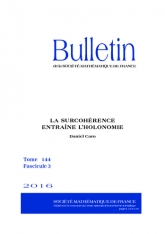La surcohérence entraîne l'holonomie
The overcoherence implies the holonomicity

- Consulter un extrait
- Année : 2016
- Fascicule : 3
- Tome : 144
- Format : Électronique
- Langue de l'ouvrage :
Français - Class. Math. : 14F30
- Pages : 429-475
- DOI : 10.24033/bsmf.2719
Soit $\mathcal {V}$ un anneau de valuation discrète complet d'inégales caractéristiques, de corps résiduel parfait. Soit $\mathfrak {X}$ un schéma formel lisse sur $\mathcal {V}$. Nous définissons la notion de $\mathcal {D} ^\dagger _{\mathfrak {X}}({}^\dagger D) _{\mathbb {Q}}$-surcohérence dans $\mathfrak {X}$ (après tout changement de base), ce qui correspond a priori à une notion plus faible que celle de $\mathcal {D} ^\dagger _{\mathfrak {X}}({}^\dagger D) _{\mathbb {Q}}$-surcohérence. Nous établissons qu'un module $\mathcal {D} ^\dagger _{\mathfrak {X}}({}^\dagger D) _{\mathbb {Q}}$-surcohérent après tout changement de base est $\mathcal {D} ^\dagger _{\mathfrak {X}}({}^\dagger D) _{\mathbb {Q}}$-holonome. De plus, nous en déduisons la propriété suivante de stabilité de la surholonomie : un complexe borné de $\mathcal {D} ^\dagger _{\mathfrak {X},\,\mathbb {Q}}$-modules $\mathcal {E}$ est surholonome après tout changement de base si et seulement si, pour tout entier $j$, $\mathcal {H} ^{j} (\mathcal {E}) $ est surholonome après tout changement de base.
$\mathcal {D}$-modules arithmétiques, holonomie, cohomologie $p$-adique
